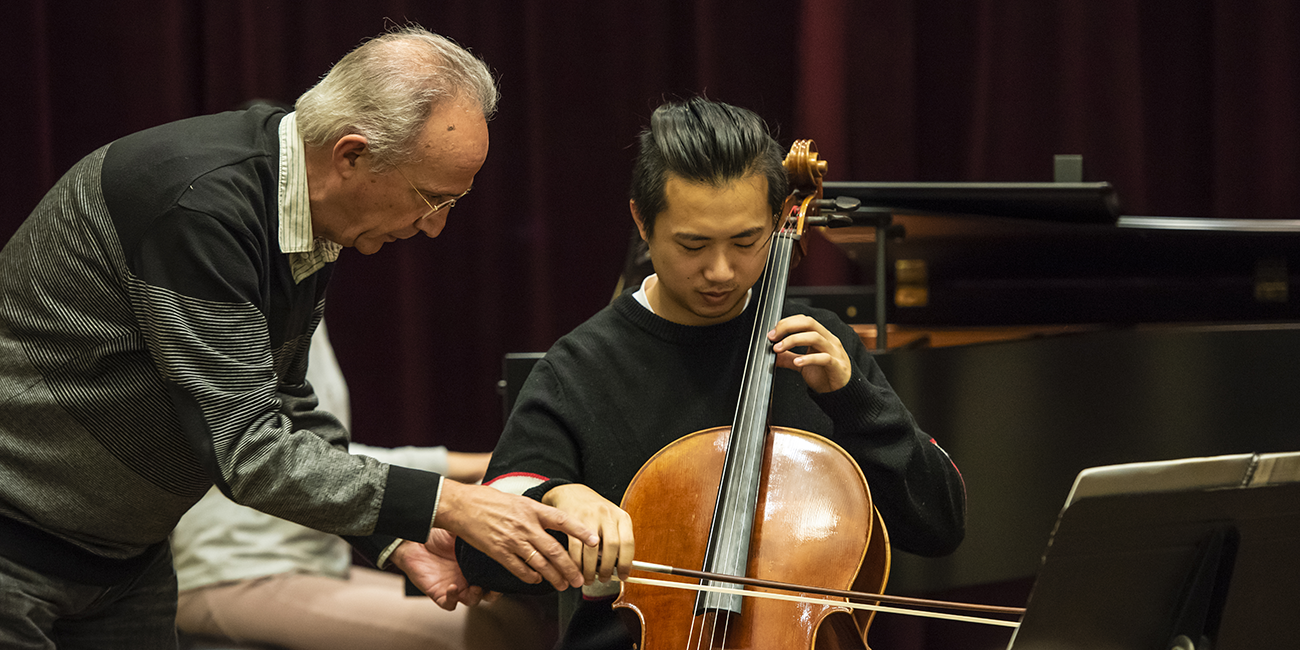Charitable Lead Trust
Make a substantial gift to New England Conservatory in the form of fixed annual payments and pass assets to your family or other heirs at reduced gift and estate tax cost.
A charitable lead annuity trust may be right for you if:
- You have substantial assets that you do not need currently for your own financial security.
- You want to provide for your family or other heirs.
- You want to save gift taxes, estate taxes, and probate costs.
- You want your gift to make a difference at NEC starting immediately.
- You could consider a gift of $500,000 or more to benefit NEC and your heirs.
How Your Gift Helps
Your gifts to the New England Conservatory help us educate and train musicians of all ages from around the world, drawing on the talent and deep reservoir of experience of our distinguished faculty. Your support will provide the University with the resources to…
 |  |  |
| inculcate the highest standards of excellence while nurturing artistic sensibility and creative growth; | foster an environment that maximizes individual attention from teachers, allowing students to explore and develop their unique artistic personalities; | reinforce and expand the position of music in society by educating the next generation of musical performers and leaders. |
Separate trust
A charitable lead annuity trust is a separate taxable trust governed by an irrevocable trust agreement. You choose the trustee who is responsible for administering your lead trust and guiding the investment of its assets.
Irrevocable gift
A charitable lead annuity trust is an irrevocable arrangement. Once you transfer assets to create the trust, you cannot change your mind and get the assets back. This requirement assures that all of the payments promised in the trust agreement will go to support NEC.
Make fixed payments to NEC each year
Your lead annuity trust makes payments to NEC each year of a fixed amount for as long as the trust lasts. Your lead trust can make payments to more than one charity, if you wish.
You choose the payment amount
You choose the amount that your lead annuity trust must distribute to New England Conservatory each year. Lead trust donors typically select a payment amount that is likely to preserve a substantial remainder for family or other heirs. Payments are usually made in annual installments, but semiannual or quarterly installments are possible.
Remaining assets to heirs
When your charitable lead annuity trust ends, all remaining principal in the trust will be transferred to the family members or other heirs you choose.
How long can my lead trust last?
While most lead annuity trusts last for a specified term of 10-20 years, other terms are possible. Your lead annuity trust can last for one or more lives or for a specific length of time, or for a combination of lives and years. The term length you choose will depend on when you want your heirs to receive their trust distribution and the size of the gift or estate tax charitable deduction you want the trust to generate, as well as other factors.
Tax benefits
Unlike other charitable trusts, the charitable lead annuity trust generates a gift or estate tax charitable deduction, not an income tax charitable deduction.
- Reduce or eliminate gift or estate tax on gift to heirs if your estate exceeds the then applicable estate tax credit.
- Avoid all gift and estate tax on asset growth.
When you transfer assets to your lead annuity trust, you make a taxable gift to the individuals who will receive your trusts principal when it ends. However, your gift of payments to NEC earns you a gift or estate tax charitable deduction in the year of your gift that will reduce, and in some cases, eliminate, your taxable gift if your estate exceeds the then applicable estate tax credit.
Some lead annuity trust donors make a point of picking a term length and payout rate that reduces their taxable gift to zero. Doing so eliminates any possibility that they will have to pay gift or estate tax on their gift.
In addition, the assets in your lead annuity trust are removed from your taxable estate. This means that any growth in the value of your trusts assets during its term can be passed on to your heirs completely free of gift and estate taxes.
Taxation of the trust
A lead annuity trust is a taxable trust. However, a lead trust pays income tax only if its income exceeds the amount it pays to NEC during the year. A careful trustee can balance your lead annuity trusts income against its charitable payments in order to minimize the income taxes paid by the trust.
Lead annuity trusts for grandchildren
Lead annuity trusts for the benefit of grandchildren present special tax planning challenges related to a tax called the generation skipping tax. For example, you may want to consider creating a charitable lead unitrust in this situation, as it is easier to plan for generation skipping tax issues when creating a lead unitrust than when creating a lead annuity trust. Please be sure to talk to your advisors or to us about these tax considerations.
Suitable funding assets
You can fund your lead annuity trust with many different kinds of assets. All of the following assets can work well:
- cash
- securities
- a closely-held business
- commercial property
- a combination of these assets
Assets that are likely to increase substantially in value over time can be especially attractive candidates for transfer into a lead trust.
Unlike with many other planned gifts, it can be problematic to fund a lead trust with highly appreciated property. Since a lead trust is fully taxable, selling a highly appreciated asset may cause the trust to owe taxes that will deplete its principal. You will want to work closely with your advisors to pick an asset or combination of assets that will best achieve your goals for your gift.
Example
Earl Williams spent his career building a successful manufacturing business, which he sold a few years ago for $10,000,000. He and his wife, Ann, have three children who are in their 30s. Earl has been reviewing his estate plan with an eye toward adding a major gift to NEC. Funding a charitable lead annuity trust offers an excellent way for Earl to provide generous support to NEC and pass assets to his three children. Earl chooses to create a $2,000,000 lead annuity trust that will pay $130,000 to NEC each year for 20 years.
Benefits
- The Williamss' three children will split approximately $2,409,955* when the trust ends.
- The Williamss will earn a gift tax charitable deduction of $1,647,916**.
- The assets used to fund the trust will not be taxable in their estate.
- NEC will receive $2,600,000 from the trust over 20 years.
* Assumes the trust assets earn a 7% annual net return.
** The Williamss' estate or gift tax charitable deduction may vary depending on the timing of their gift.
Additional Giving Options
By making a planned gift, you can strengthen NEC and gain financial and tax benefits for you and your family. For more information, please contact Aaron McGarry, Planned Giving Officer, by email or by phone at 617-585-1356.
Real estate can be contributed as an outright gift or to finance a planned gift. Available options include a retained life estate, which allows the donor to continue to use the property for a certain number of years, or for the donor’s lifetime. Other arrangements offer special tax advantages and lifetime income.
Gifts of real estate include undeveloped land, a residence, a vacation home, a farm, or commercial property. NEC requires the donor to bear certain costs when making a real estate gift, such as an appraisal to determine the fair market value. Also, NEC deducts transaction costs from the proceeds of the sale of the property, including the closing costs, title insurance, a survey (if needed), and any taxes due before the gift is completed.
For any questions about gifts of real estate, please contact Abigail Smitka, Assistant Vice President of Major Gifts and Campaigns, at as3628@necmusic.edu or (617) 585-1719.
Many companies support the philanthropic interests of their employees by matching employee contributions to nonprofit organizations like NEC. If your employer offers a matching gift program, you may be able to double or even triple your gift!
For more information on matching gift contributions, please contact Cheryl Fries, Assistant Director of Advancement Operations, at cheryl.fries@necmusic.edu or (617) 585-1373.
Gifts of personal property, such as musical instruments, recordings, and scores provide valuable support for our music education programs. Through the support of in-kind gifts, you can help NEC meet the college’s ongoing need to expand its inventory — and you qualify for a tax deduction.
NEC accepts in-kind donations on a case-by-case basis. For more information, please contact Patricia Kopko, Director of Advancement Operations, by email or phone at 617-585-1225
Friends of NEC may elect to make gifts to commemorate a loved one’s life, birthday, anniversary, or other special occasion. We will gladly notify those you wish to know of any gifts made in their honor.
Contributions in any amount may be directed to The NEC Fund, or to the area of your choice. Please note the name of the person you wish to commemorate when you make your gift.
Contact Us
To learn more about how you can support NEC, please contact Cheryl Fries, Assistant Director of Advancement Operations, at cheryl.fries@necmusic.edu or (617) 585-1373.
New England Conservatory is a 501(c)3 non-profit organization. All donations are tax deductible to the full extent of the law. Our non-profit tax ID is 23-7225104.
Contact Us






